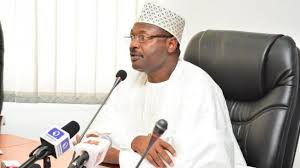The Independent National Electoral Commission is preparing to announce which of the two main candidates, the incumbent Muhammadu Buhari or Atiku Abubakar, won Saturday’s presidential election.
The chairman of INEC, Mahmood Yakubu, will declare results for each of the 36 states and the Federal Capital Territory, including Abuja, before announcing the overall winner — a process that could take around 48 hours.
To win, a candidate must get the majority of votes and at least 25 percent in two-thirds of the states. If none of them achieve that, there’ll be a second round. Analysts were more or less split down the middle over who would clinch victory.
Buhari, a 76-year-old ex-general going for a second and final four-year term, and Abubakar, 72, a business tycoon and former vice president, are both Muslims from the north. Buhari will probably win the region.
Abubakar is expected to dominate in the south-east and south-south, two of Nigeria’s six so-called geopolitical zones, where Buhari has long been unpopular. The south-west, which includes the commercial capital of Lagos, and the north-central zones could be crucial swing areas.
Almost 73 million people were eligible to vote, according to INEC. Turnout during the last election was 44 percent. If that’s repeated this time, the number of voters in Africa’s most populous nation of almost 200 million people will be closer to 30 or 35 million.
Kano state, which will probably have the highest number of voters nationwide, will be crucial. Senate President Bukola Saraki, an opposition politician, said in an interview last week that Buhari’s share of the vote in the region could drop to around 60 percent. “He can’t win if he’s pulling these kinds of numbers in his base,” Saraki said.
In the Northeast, Atiku is confident, and he’s confident he can cut Buhari’s support, which was just below 80 percent at the last election. Adamawa state will be one to watch. If it swings to Abubakar, who’s from there but lost at the polling station where he voted, it may be a signal that Buhari’s grip on the north is no longer ironclad.
The North-central borne the brunt of clashes between farmers and herders that killed around 2,000 people last year, according to Amnesty International. That could dent the prospects of Buhari, who won 59 percent of the votes in 2015.
Niger state will be important. Buhari triumphed there four years ago. But Ibrahim Babangida, a former Nigerian military ruler who lives in Niger and holds plenty of sway over its politics, opposes him.
As for the south-west, it was the closest-fought zone in 2015 and whoever gets it will again be in prime position to take the presidency. Lagos is key.
While the state tends to have a low turnout, its population of about 20 million means it carries plenty of weight. Buhari’s All Progressives Congress is desperate to retain control of Lagos and its neighboring states, given they account for a large chunk of gross domestic product.
But their businesses and populations have been hit hard by the economy’s slump since oil prices crashed in 2014, meaning they could swing to Abubakar’s People’s Democratic Party.
In the South-east and South-south, it’s not a question of whether Abubakar wins, but by how much. Jonathan got more than 90 percent of the votes four years ago. Turnout will be vital for the PDP. If voting numbers are high, that will probably be a blow to Buhari.

 Business7 days ago
Business7 days ago
 Business6 days ago
Business6 days ago
 Education7 days ago
Education7 days ago
 Crime7 days ago
Crime7 days ago
 Football14 hours ago
Football14 hours ago
 Covid-196 days ago
Covid-196 days ago
 Business7 days ago
Business7 days ago
 Latest4 days ago
Latest4 days ago

